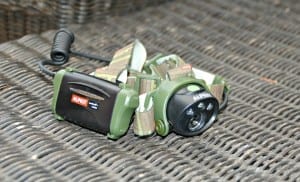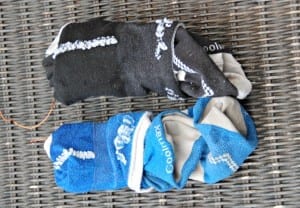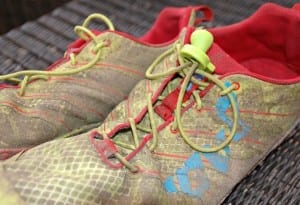Welcome to a weekly feature on my blog – Ben’s Zone. Written by husband… Ben. A foodie, coffee obsessed, ex-smoking, ex-drinking and Ridgeback loving Dad. Who is also seriously into his fitness. You can find him on the blog (most) Sundays. Enjoy 🙂
Winter Training Essentials
I often bang on about training in the winter and how it doesn’t stop me getting out there. I’m too cheap to pay for a gym and I don’t have time to go anyway, so I have to deal with the elements. It’s not without advantages anyway, you get to buy new kit (I love new kit), you get to have fun in the mud and best of all, every cold and muddy training session feels like a small victory when you get in. Some aspects of winter training centre around attitude and I can’t say more on that than I have here, but what I can help out with is sharing the kit that me through the winter months. All of this stuff is battle tested and stuff I’ve bought myself.
1. Head Torch
This is essential unless you’re lucky enough to be able to run in the middle of the day, if you’re trail running in the dark without a good head torch you’re dumb, period. Trail running, no matter how well you know the routes, demands a total awareness of your immediate environment and a key sense feeding in to this is sight. Being unaware of a slippery root or puddle can mean a twisted ankle or knee that can keep you out for weeks, night vision is ok for walking (perhaps) but moving at speed requires good light. Luckily there are a raft of good head torches using modern LED technology which provide excellent light and good burn times.
My weapon of choice is the Alpkit Gamma. I like it because it is well made and well priced. The beam pattern is nice and tight and the lamp itself has a robust tilt mechanism. The tilt is good as it means you can seat the lamp comfortably on the forehead and still bring the beam focus in close. Another nice feature is 3 smaller LEDs for map reading, low power running and night vision respectively. I tend not to use those too much but low power would be nice for running with mates. Finally there is a red LED on the rear which can be solid or made to blink. This is awesome for idiot dogs that spend too long sniffing and lose their owners in the dark (I’m looking at you, Florence).
In terms of what I don’t like? You can’t use rechargeable batteries on the Gamma (you can on the new Arc which is more powerful but nearly twice the price) but the burn time is great on alkaline. The straps can be a bit fiddly but once you have them set up this is not an issue. Good quality, reasonably priced kit.
2. Trail shoes

In summer you can trail run in road shoes, even fairly sketchy game trails in my local forest get nice and packed and so you can navigate them well enough, things are different when the mornings start drawing in. This morning I ran the same run I always do and found a number of new boggy bits. I could attempt to tap dance around them ignoring the look of scorn from the dog but I’m not about that. I don’t want to stop or slow down, so trail shoes are a must. Everyone will have their own preference but the basics are as follows, good deep lugs to give traction in the sucky stuff, good drainage to let the water out and a nice flexible sole so your feet can tell your body what’s going on around it. Last year I ran Adidas Kanadias which are a really great introduction to trail shoes. They’re similar in look and feel to road shoes while incorporating all the necessary features. When I killed them I decided to make a fairly drastic change and go for Inov8 Trailroc 150s. These are super light barefoot style shoes and though they are a different experience I feel more comfortable in them than I did the Kanadias. The basics are still there though, they dry out quickly and have nice big teeth to drag me through the swamps. I’m not going to make a specific recommendation here as it depends so much on what you like in terms of fit and feel and where you stand on the whole barefoot debate. I’m going to include the Trailrocs in a long term kit review in the new year once I’ve spent some more time attempting to destroy them.
3. Warm kit
 You’ll warm up as you work out, to a point. If you’re clothed inappropriately you’ll turn a mud slog into misery. As the temperature drops I’ll add in a short sleeve compression top under my running vest and then perhaps some longer running tights with fleece lining (mine are Under Armour but most running brands do them). I don’t mind my arms being exposed but it’s vital to keep the core warm. Personally I don’t really bother with jackets but your mileage may vary. By the time I line up for winter Tough Guy I’ll have added in a neoprene hat and neoprene long sleeve vest to the mix, hypothermia is far less fun than it appears to be. In the picture you can see a compression top, running vest and some Under Armour tights. Being honest, the Under Armours were given to me in exchange for writing the piece on winter training I reference above. I wouldn’t normally spend that much on kit as, firstly, I don’t see the point when you can get nice kit cheaply and secondly I am hard on kit and so go through it quickly. For compression gear I favour Didoo as it’s nice and thick and after a year is still good in terms of elasticity. I have tried other compression tops (notably Under Armour) and found them a bit flimsy. For general running gear like tights and vests I go for More Mile. Again, basic but it fits well, washes well and has lasted me well (I’ve been using it for over a year). You don’t get the cool colour schemes of some of the more expensive brands, but my kit spends most of the time covered in mud so I really don’t care.
You’ll warm up as you work out, to a point. If you’re clothed inappropriately you’ll turn a mud slog into misery. As the temperature drops I’ll add in a short sleeve compression top under my running vest and then perhaps some longer running tights with fleece lining (mine are Under Armour but most running brands do them). I don’t mind my arms being exposed but it’s vital to keep the core warm. Personally I don’t really bother with jackets but your mileage may vary. By the time I line up for winter Tough Guy I’ll have added in a neoprene hat and neoprene long sleeve vest to the mix, hypothermia is far less fun than it appears to be. In the picture you can see a compression top, running vest and some Under Armour tights. Being honest, the Under Armours were given to me in exchange for writing the piece on winter training I reference above. I wouldn’t normally spend that much on kit as, firstly, I don’t see the point when you can get nice kit cheaply and secondly I am hard on kit and so go through it quickly. For compression gear I favour Didoo as it’s nice and thick and after a year is still good in terms of elasticity. I have tried other compression tops (notably Under Armour) and found them a bit flimsy. For general running gear like tights and vests I go for More Mile. Again, basic but it fits well, washes well and has lasted me well (I’ve been using it for over a year). You don’t get the cool colour schemes of some of the more expensive brands, but my kit spends most of the time covered in mud so I really don’t care.
4. Lots of pairs of running socks
There are a number of waterproof socks on the market and I’m sure they are great, for me, I don’t see the point. I often run through deep mud and puddles and whatever the material of the sock, the big hole where my leg goes in becomes the chief weakness. On the other hand, cold, wet feet before the run even starts is a recipe for grumpiness. My solution is to simply have ample supplies of coolmax running socks. They don’t keep you particularly warm and they are certainly not waterproof but I can chuck them in the wash at the end of the run and have a nice fresh dry pair for the next day (for the 5 minutes until I get wet again). I don’t have a brand preference for socks, I buy whatever is on offer. If the sock has Coolmax, then that’s better as I think it’s worth it in the summer.
5. Super bungie lace things
I don’t really like wearing gloves to run in so my hands get cold. I can live with that. The only time it becomes an issue is when I am trying to get my shoes off prior to going in the house. Frozen sausage fingers and tight laces do not work well together. The solution for me are ‘lock laces’. I don’t have a specific preferred brand but I use them on all my shoes now. The notion is that the laces are elasticised and held in place by spring locks. It’s technology from the strangely serious world of triathlons but I find it works well enough for my needs. Another bonus is that it’s a relatively low cost solution (it has to be really as I’m not prepared to spend money on laces). You can get the bungie lace things on Amazon or Ebay, brand is not important (getting the colour to match your shoes is most definitely the dominant factor here).
So there you have it, the kit that keeps me going through the ice and snow, but more commonly (as I live in England) the slightly cold drizzle.





